BENGHONG Siela Bossba
Former Research Assistant
Ms Benghong Siela Bossba has recently graduated from two universities. Upon her graduation in 2020, she has joined CDRI as an intern at CDET. She holds a BA in International Relation from Institute of Foreign Languages (IFL) and a LL.B. in English Language Based Bachelor of Law from Royal University of Law and Economics (RULE). Currently, she is a Research Assistant at CDET.
Email : bossba@cdri.org.kh
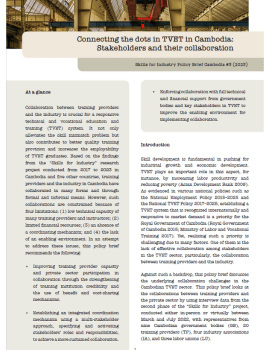
Collaboration between training providers and the industry is crucial for a responsive technical and vocational education and training (TVET) system. It not only alleviates the skill mismatch problem but also contributes to better quality training provision and increases the employability of TVET graduates. Based on the findings from the “Skills for...
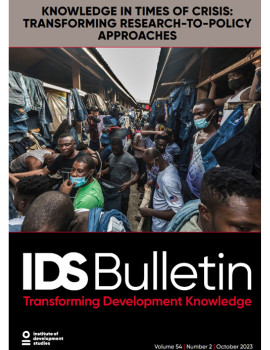
During the Covid-19 pandemic, research organisations have strived to be resilient. This means navigating through the technical, operational, and political challenges to achieving successful research implementation. Particularly for local policy research thinktanks, the pandemic has made these challenges even more difficult to address. From the expe...
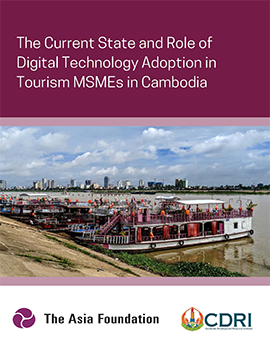
The majority of businesses in Cambodia are micro, small, and medium-sized enterprises (MSMEs), which account for 99.9 percent of all businesses and a sizable portion of employment in the private sector. The adoption of digital technology (DT) among Cambodian MSMEs is still uneven and relatively low, despite the fact that it has become an essenti...

Evaluating the Role of Digital Technology in Boosting MSME Productivity in Cambodia's Tourism Sector
This research examines the impact of digital technologies on the productivity of Micro, Small and Medium Enterprises in Cambodia's tourism sector. Drawing from extensive survey data, the study confirms that higher DT investments correlate with increased productivity. Notably, MSMEs at the intermediate level of DT integration experience a marked 16...
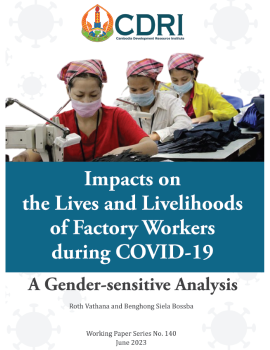
This study examines the gendered impacts of COVID-19 on Cambodia’s garment, textile, and footwear (GTF) sector, which employs around 800,000 workers—80 percent of whom are women. Using data from a phone survey of 2,000 workers conducted in mid-2021, the study explores changes in earnings, consumption, remittances, mental health, domestic responsibi...
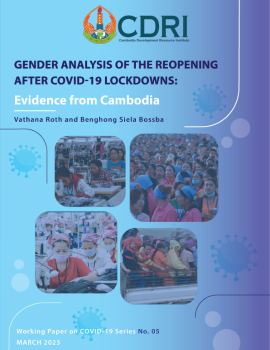
We quantify the effects of reopening economic activities after the COVID-19 pandemic lockdown on the lives and livelihoods of the workers in the garment, footwear, and travel goods sector in Cambodia. We employ fixed-effects difference-in-differences and quantile regression analyses using a panel survey of 2,000 workers interviewed by phone in...

The COVID-19 pandemic has disrupted most aspects of socioeconomic development, with the garment, manufacturing and textile industry being no exception. Decreased demand for orders has led to factory closures, and workers being suspended or laid off. The empirical evidence in this policy brief captures the impact of COVID-19 on the livelihoods of 20...
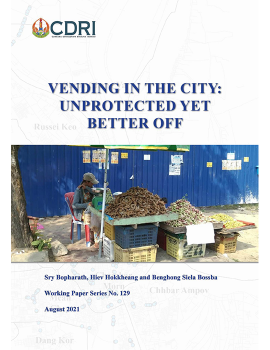
Street food vending is a vital part of the urban economy, and the poor, in particular, rely on it to earn their living. We examine their socio-economic dimension, especially their backgrounds and business operations and challenges, as well as the perspectives on life satisfaction among different income earners. Importantly, we looked at the margina...

The innovation and entrepreneurial activities have multiplied recently, with many new companies emerging in various industries. However, start-ups face many challenges, such as access to talent, idea, markets, and funding. Creating new idea or launching business is essential to have partners that can stimulate their thoughts and elevate both ca...

PAGE is a joint initiative of the ILO, UNDP, UNEP, UNIDO and UNITAR. It was launched in 2013 to support countries in building economies that are environmentally sustainable. The initiative leads and assists partnering countries in their transition to an inclusive green economy. Cambodia is one of PAGE's partnering countries. With financial support...

Digital technologies have evolved at breakneck speed and spread, changing not only the digital ecosystem but also the way economy, trade and business are functioning. Massive digital transformation and its associated broad benefits for development have prompted most countries to embrace digital technology and incorporate it into their economic deve...

Over the last 20 years, the Kingdom of Cambodia has made remarkable progress in creating an enabling environment for business and investment, making the country favourable for foreign direct investment (FDI) in the region and creating commercial and export opportunities for local businesses. With this favourable business environment, Cambodia achie...
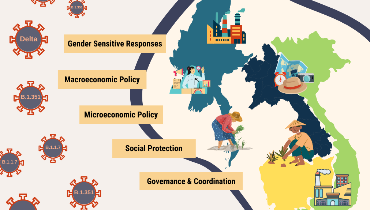
In close coordination with local governments and organizations, the project will identify gender-sensitive policies and good practices from the macro to micro level that will support the recovery process and improve resilience among vulnerable women workers and micro, small, and medium enterprises. It will facilitate policy dialogue and coordin...
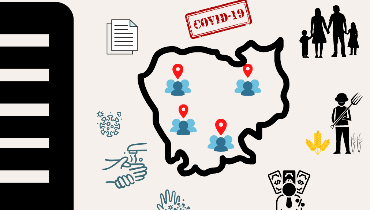
The recent coronavirus pandemic has triggered economic crises in both developing and developed countries. In the case of Cambodia, the number of infections is low relative to other neighbouring ASEAN countries, such as Thailand, Philippines, and Indonesia. However, several sectors have been seriously affected by the non-pharmaceutical measures and...

Under the Capacity Building Research and Development Fund of the Ministry of Posts and Telecommunications, United Nation Development Programme, Cambodia and the Russian Federation, the Cambodia Development Resource Institute in collaboration with the Cambodia Academy of Digital Technology (formerly known as the National Institute of Posts, Telecoms...
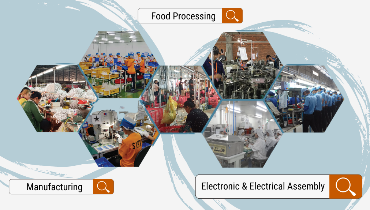
The project is implemented in two phases. Phase 1 focuses on the demand side of the labour market in garments, electronic and electrical assembly, and food processing industries. It aims at understanding the linkages between company growth and transformation as well as vocational skills development. Phase 2 is devoted to studying on the supply...

The purpose of the project is to examine the portfolio of street vendors in nine districts in Phnom Penh. The survey looks at their education, economic activities, income and expenses, and their life satisfaction. There are two phases. The first phase involved with mapping of 1,141 street vendors on 53 locations. 553 samples were randomly selected...
